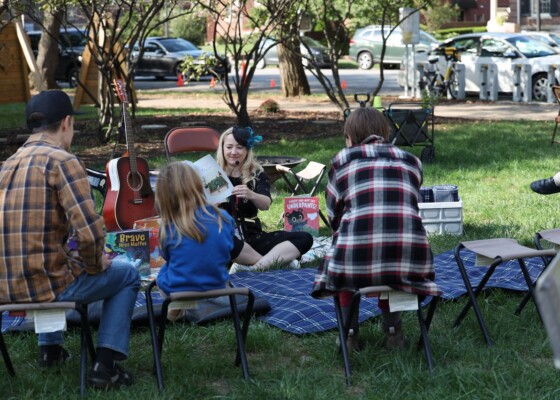Nature Reads: A Time to Reminisce
July 19, 2016I had one of those liberal arts/flannel/humanities/late 90s, college experiences where I did a lot of reading and thinking. Reading and debating. Reading and having annoying intellectual conversations about “The…
I had one of those liberal arts/flannel/humanities/late 90s, college experiences where I did a lot of reading and thinking. Reading and debating. Reading and having annoying intellectual conversations about “The World” that would definitely embarrass me now. So, when asked to write a blog post recommending some top nature reads for Next Indiana Campfires, I immediately traveled back to that time.
I took a freshman seminar called “The Human Constructions of Nature,” or something equally pretentious. While it’s easy for me to mock now, it totally blew my mind and changed my life and how I relate to the natural world. We read many of the nature classics, but I only remember Edward Abbey’s “Desert Solitaire.”
I don’t remember the content of the book, so much as I remember the feeling. I had been an environmentalist since the second grade, when I learned to “Save The Whales,” so I was surprised that college had anything to teach me about nature. But after reading this book, suddenly the natural world looked very different. It was revolutionary.
My copy of “Desert Solitaire” is long gone. Lent to a youthful college crush who was moving out west to become a cowboy, I’m sure. But luckily, we have the internet now, and I can share with you some passages from the book, hopefully to evoke those same feelings I had.
A passage on how to experience The Great Outdoors:
“No more cars in national parks. Let the people walk. Or ride horses, bicycles, mules, wild pigs–anything–but keep the automobiles and the motorcycles and all their motorized relatives out. We have agreed not to drive our automobiles into cathedrals, concert halls, art museums, legislative assemblies, private bedrooms and the other sanctums of our culture; we should treat our national parks with the same deference, for they, too, are holy places. An increasingly pagan and hedonistic people (thank God!), we are learning finally that the forests and mountains and desert canyons are holier than our churches. Therefore let us behave accordingly.”
A passage on wilderness as refuge:
“A man could be a lover and defender of the wilderness without ever in his lifetime leaving the boundaries of asphalt, powerlines, and right-angled surfaces. We need wilderness whether or not we ever set foot in it. We need a refuge even though we may never need to set foot in it. We need the possibility of escape as surely as we need hope; without it the life of the cities would drive all men into crime or drugs or psychoanalysis.”
A passage on why Phoenix is just not ok:
“Water, water, water….There is no shortage of water in the desert but exactly the right amount , a perfect ratio of water to rock, water to sand, insuring that wide free open, generous spacing among plants and animals, homes and towns and cities, which makes the arid West so different from any other part of the nation. There is no lack of water here unless you try to establish a city where no city should be.”
And…naturally:
“So I lived alone. The first thing I did was take off my pants. Naturally.”
All this is to say, there is great power in literature to transform your worldview and challenge your heart. And there is nothing that defines summer better than reading on the top of a mountain, from the prow of a boat, or in your backyard hammock. Looking for a book to take on your next outdoor adventure? Make your way to Indy Reads Books, and our lovely staff can show you our nature collection.
—————————————————-
Next Indiana Campfires is a unique way to connect nature, literature and Indiana’s Bicentennial. The program is supported by the Efroymson Family Fund, the Nina Mason Pulliam Charitable Trust and Pulitzer Prizes Centennial Campfires. Indiana Humanities is supported in part by Lilly Endowment Inc. and the National Endowment of the Humanities.
This post is written by Alyssa Starr Newerth, a graduate of Indiana University. She has walked her way through several National Parks. As Deputy Director of Indy Reads, she oversees Indy Reads Books, and loves making book recommendations. The post is part of the weekly blog series devoted to the initiative. Check back every Tuesday to learn more about Indiana’s great environmental literature, find out interesting facts about Hoosier stewardship, get all the latest program details and more.


